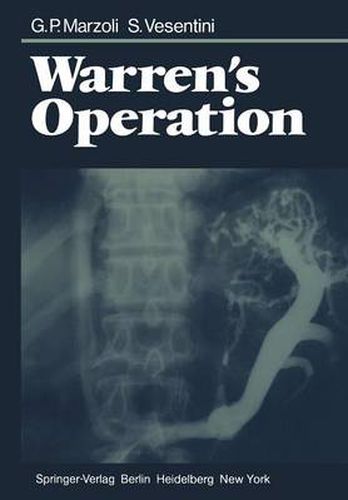Readings Newsletter
Become a Readings Member to make your shopping experience even easier.
Sign in or sign up for free!
You’re not far away from qualifying for FREE standard shipping within Australia
You’ve qualified for FREE standard shipping within Australia
The cart is loading…






This title is printed to order. This book may have been self-published. If so, we cannot guarantee the quality of the content. In the main most books will have gone through the editing process however some may not. We therefore suggest that you be aware of this before ordering this book. If in doubt check either the author or publisher’s details as we are unable to accept any returns unless they are faulty. Please contact us if you have any questions.
I have particular pleasure in introducing this publication by Gian Pietro Marzoli and Sergio Vesentini. Years ago they enthusiastically accepted my suggestion that they should take specific interest in the clinical and surgical problem of portal hypertension, and assess the proposals of surgical ex- perience with regard to this debated physiopathological picture. These thanks are all the more real because in this way the school’s attention remained fixed on a subject that had already attracted it profoundly from the start - with Giovanni Castiglioni and Vittorio Pettinari as heads of the school - and then threatened to die away into general con- formism. In Italy precariousness is easily extended to the concept of school continuity. In Warren’s proposal (1967) of distal splenorenal anas- tomosis with disconnection of the spleno-oesophageal from the mesenteric district , I felt there was an intelligent at- tempt to solve all the basic problems, albeit in different ways. An attempt, that is to say, at alleviating the gastro- oesophageal circulation, thus avoiding* haemorrhage, and at ensuring that the liver would maintain the circulatory ef- ficiency with which it was still endowed. The spleen was re- tained, but there was reason to think that, by reducing blood stasis within its ambit, it would be possible to manage or alleviate any hypersplenism: not an absurd hypothesis if the Americans had sometimes noted in their material function- al and even anatomical reversion of the splenopathy after a simple portacaval shunt.
$9.00 standard shipping within Australia
FREE standard shipping within Australia for orders over $100.00
Express & International shipping calculated at checkout
Stock availability can be subject to change without notice. We recommend calling the shop or contacting our online team to check availability of low stock items. Please see our Shopping Online page for more details.
This title is printed to order. This book may have been self-published. If so, we cannot guarantee the quality of the content. In the main most books will have gone through the editing process however some may not. We therefore suggest that you be aware of this before ordering this book. If in doubt check either the author or publisher’s details as we are unable to accept any returns unless they are faulty. Please contact us if you have any questions.
I have particular pleasure in introducing this publication by Gian Pietro Marzoli and Sergio Vesentini. Years ago they enthusiastically accepted my suggestion that they should take specific interest in the clinical and surgical problem of portal hypertension, and assess the proposals of surgical ex- perience with regard to this debated physiopathological picture. These thanks are all the more real because in this way the school’s attention remained fixed on a subject that had already attracted it profoundly from the start - with Giovanni Castiglioni and Vittorio Pettinari as heads of the school - and then threatened to die away into general con- formism. In Italy precariousness is easily extended to the concept of school continuity. In Warren’s proposal (1967) of distal splenorenal anas- tomosis with disconnection of the spleno-oesophageal from the mesenteric district , I felt there was an intelligent at- tempt to solve all the basic problems, albeit in different ways. An attempt, that is to say, at alleviating the gastro- oesophageal circulation, thus avoiding* haemorrhage, and at ensuring that the liver would maintain the circulatory ef- ficiency with which it was still endowed. The spleen was re- tained, but there was reason to think that, by reducing blood stasis within its ambit, it would be possible to manage or alleviate any hypersplenism: not an absurd hypothesis if the Americans had sometimes noted in their material function- al and even anatomical reversion of the splenopathy after a simple portacaval shunt.